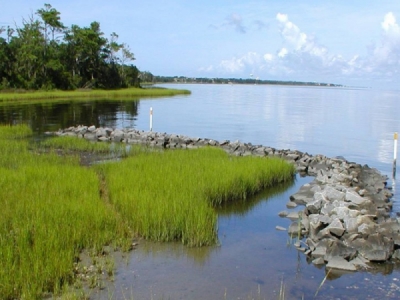
Posted on April 6, 2020
Nine projects in coastal North Carolina have been awarded millions in funding to go toward improving community resilience and wildlife habitat.
The National Fish and Wildlife Foundation, or NFWF, and National Oceanic and Atmospheric Administration’s Office for Coastal Management announced March 17 more than $43 million in grants have been awarded to 27 natural and nature-based infrastructure projects nationwide.
The projects are to help recover from hurricanes Michael and Florence, Typhoon Yutu, and the California coastal wildfires of 2018, which together caused more than $50 billion in damage and severely degraded a range of wildlife habitats.
These projects are expected to protect or enhance more than 20 miles of shoreline and nearly 8,000 acres of wildlife habitat and will use nature-based infrastructure such as living shorelines, wetlands, dunes, coastal forests, floodplain habitat and coral reefs to achieve the dual benefits of improving human community resilience while also improving the ecological integrity of coastal ecosystems that enhance fish and wildlife habitats, according to the announcement.
“This new Emergency Coastal Resilience Fund supports conservation projects that strengthen natural systems at a scale that will help protect coastal communities in the states that were impacted by these disasters from the future impacts of storms, floods, wildfires and other natural hazards,” said Jeff Trandahl, CEO and executive director of NFWF, in a statement. “These same projects also improve the ecological integrity and functionality of coastal ecosystems to support populations of fish and wildlife.”
In addition to the nine projects in North Carolina, projects in Alabama, California, Florida, South Carolina, Virginia and the Commonwealth of the Northern Mariana Islands received funding. These projects will also receive more than $54.7 million in funds from other sources, or matching funds, to generate a total conservation impact of nearly $98 million.
“We must renew and build resilient coastal communities if we are to strengthen and grow our nation’s Blue Economy,” said retired Navy Rear Adm. Tim Gallaudet, deputy NOAA administrator. “These grants are essential to helping sustain the well being of the citizens affected by these natural disasters. Vibrant coasts power American prosperity.”
Source: coastalnewstoday





